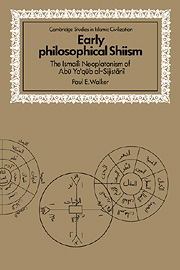Book contents
- Frontmatter
- Contents
- Preface
- Acknowledgments
- Note on transliteration
- List of abbreviations
- PART I AL-SIJISTĀNĪ'S HERITAGE
- 1 The Ismaili message and its philosophers
- 2 Religious and philosophical resources
- 3 Ismaili predecessors
- PART II AL-SIJISTĀNĪ'S UNIVERSE
- EPILOGUE: THE USE AND CONTROL OF REASON
- Notes
- Select bibliography
- Index
3 - Ismaili predecessors
Published online by Cambridge University Press: 02 November 2009
- Frontmatter
- Contents
- Preface
- Acknowledgments
- Note on transliteration
- List of abbreviations
- PART I AL-SIJISTĀNĪ'S HERITAGE
- 1 The Ismaili message and its philosophers
- 2 Religious and philosophical resources
- 3 Ismaili predecessors
- PART II AL-SIJISTĀNĪ'S UNIVERSE
- EPILOGUE: THE USE AND CONTROL OF REASON
- Notes
- Select bibliography
- Index
Summary
The sense of engagement in an intellectual religious struggle against his critics, so prominent and unavoidable in al-Sijistānī's latter works al-Iftikhār and Sullam al-najāt, is almost equaled in the earlier ones by his impatience with his own predecessors. Yet al-Sijistānī owed an immense debt himself both to an unknown group of philosophers who wrote or compiled the Neoplatonic materials in Arabic discussed in the preceding chapter, and to colleagues in the Ismaili da ‘wa who began the scholarly tradition he later took up. These colleagues, moreover, were themselves philosophically inclined in many instances. Therefore it is necessary at this point to explore how much and to what degree philosophy had already penetrated the thinking of the dā̔īs before his time.
Early Ismaili doctrine and the advent of philosophy
The earliest clear indication of distinct doctrinal activity on the part of the Ismailis comes from the second half of the third/ninth century, perhaps as early as mid-century. What is known of Ismaili doctrines from that period, however, does not include any of the philosophical material that appears later with al-Nasafī and Abū Ḥātim al-Rāzī. Therefore an investigation of the process whereby Ismaili doctrines developed from still inadequately explained Shiite lore, which circulated at the end of the third/ninth century, into the sophisticated and complex pronouncements of the great philosophical theologians, al-Sijistānī and al-Kirmānī, fifty to a hundred years later, ought to be quite instructive, if this process can in fact be described as a development from one distinct stage to another.
- Type
- Chapter
- Information
- Early Philosophical ShiismThe Isma'ili Neoplatonism of Abu Ya'qub al-Sijistani, pp. 46 - 64Publisher: Cambridge University PressPrint publication year: 1993



